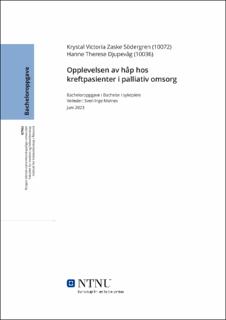| dc.contributor.advisor | Molnes, Sven Inge | |
| dc.contributor.author | Södergren, Krystal Victoria Zaske | |
| dc.contributor.author | Djupevåg, Hanne Therese | |
| dc.date.accessioned | 2023-07-14T17:23:49Z | |
| dc.date.available | 2023-07-14T17:23:49Z | |
| dc.date.issued | 2023 | |
| dc.identifier | no.ntnu:inspera:146721079:152683775 | |
| dc.identifier.uri | https://hdl.handle.net/11250/3079140 | |
| dc.description.abstract | Bakgrunn: Håp kan virke som en drivkraft i livet til kreftpasienter i palliativ omsorg. Da et økende antall pasienter blir diagnostisert med kreft hvert år, trenger sykepleiere økt kunnskap om betydningen av håp for pasientgruppen. Hensikten med litteraturstudien er å undersøke hvordan kreftpasienter i palliativ omsorg opplever håp.
Metode: En systematisk litteraturstudie basert på seks kvalitative og to kvantitative forskningsartikler. Vi brukte Evans’ innholdsanalyse for å bearbeide artiklene og kategorisere funnene.
Resultat: Kreftpasientene i palliativ omsorg opplever håp individuelt, og håpet kan forandre seg over tid. Det er både indre og ytre faktorer som kan påvirke håpet til individet, som pasientens identitet, sosial støtte og sykdommen selv.
Konklusjon: Håp er viktig for å mestre situasjoner i livet. Å møte en pasient som et individ og hvor de er, er sentralt for en god opplevelse av håp. Gode kommunikasjonsferdigheter og tid under samtalen med pasienten kan være avgjørende for å fremme, opprettholde eller gjenvinne håpet. Videre bør sykepleiere være oppmerksomme på vendepunkter i et forløp hvor en pasient trenger ekstra støtte fra sykepleieren. | |
| dc.description.abstract | Background: Hope can act as a driving force in the lives of cancer patients in palliative care. As an increasing number of patients are diagnosed with cancer each year, nurses need increased knowledge about the importance of hope for this patient group. The purpose of this literature review is to investigate how cancer patients in palliative care experience hope.
Design: A systematic literature study based on six qualitative and two quantitative research articles. We used Evan’s content analysis to analyze the articles and categorize the findings.
Results: Cancer patients in palliative care experience hope individually and this hope can change over time. There are both internal and external factors that can affect the hope of the individual, such as the patient’s identity, social support and the disease itself.
Conclusion: Hope is important to overcome situations in life. Meeting a patient as an individual and in the now, is paramount for a positive feeling of hope. Good communication skills and time during the conversation with patients may be key to foster, preserve and regain hope. Furthermore, nurses should be aware of turning points during the course of palliative care where patients require extra support from the nurse. | |
| dc.language | nob | |
| dc.publisher | NTNU | |
| dc.title | Opplevelsen av håp hos kreftpasienter i palliativ omsorg | |
| dc.type | Bachelor thesis | |
